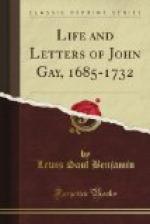My strains with Carolina’s name
I grace.
The lovely parent of our royal race.
Breathe soft, ye winds, ye waves in silence
sleep;
Let prosp’rous breezes wanton o’er
the deep,
Swell the white sails, and with the streamers
play,
To waft her gently o’er the wat’ry
way.
With true poetic exaggeration he extolled Caroline’s virtues, and then, so that there should be no excuse for misunderstanding, said in plain terms that he had desired a post at Court, and made it perfectly clear that he was still prepared to accept such employment, if so be as it was coupled with suitable remuneration:—
Since all my schemes were baulk’d,
my last resort,
I left the Muses to frequent the Court;
Pensive each night, from room to room
I walk’d,
To one I bow’d, and with another
talk’d;
Inquir’d what news, or such a lady’s
name,
And did the next day, and the next, the
same.
Places I found, were daily giv’n
away,
And yet no friendly Gazette mention’d
Gay.
Gay’s protestations of delight at the accession to the throne of the House of Hanover would probably have been regarded as more sincere if, unfortunately, he had not a few months before dedicated “The Shepherd’s Week” to Bolingbroke. His very outspoken hint in the “Letter to a Lady” was ignored; but Caroline, who liked eulogy as much as anyone, received him kindly; and when in February, 1715, he produced “The What D’ye Call It” at Drury Lane Theatre, she and her consort attended the first performance. But still, no place was found for him at Court. “Tell me,” Swift asked him so much later as 1723, “are you not under original sin by the dedication of your Eclogue to Lord Bolingbroke?”
[Footnote 1: The Guardian, No. 32; April 17th, 1713.]
[Footnote 2: Dr. Johnson in his “Lives of the Poets” attributes the authorship to Steele (Works, ed. Hill), III, p. 269.]
[Footnote 3: Introductory Memoir by John Underhill, in his edition of the Poems of John Gay ("The Muses’ Library"), I, xxxi.]
[Footnote 4: Works (ed. Hill), III, p. 269.]
[Footnote 5: Specimens, I, p. 298.]
[Footnote 6: Dictionary of National Biography, article, Gay.]
[Footnote 7: Swift: Works (ed. Scott), XVI, p. 113.]
[Footnote 8: Ibid., XVI, p. 117.]
[Footnote 9: Ibid., XVI, p. 123.]
[Footnote 10: Swift: Works (ed. Scott), XVI, p. 193.]
[Footnote 11: Swift: Works (ed. Scott), XVI, p. 204.]
[Footnote 12: Pope: Works (ed. Elwin and Courthope), VII, p. 415.]
[Footnote 13: Swift: Works (ed. Scott), XVI, p. 213.]
CHAPTER V
1715-1719
“The What D’ye
Call It”—An Epistle to the Right Honourable
the
Earl of Burlington—“Trivia,
or, The Art of Walking the Streets of
London”—“Three
Hours After Marriage.”




